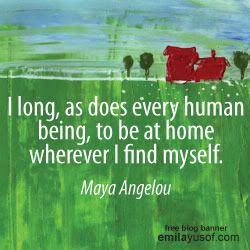Linda said...
You say, "in the sacred space, anyone who understands can become your twin..." Please explain what is meant by "sacred space."
You say, "in the sacred space, anyone who understands can become your twin..." Please explain what is meant by "sacred space."
 Hi Linda: When I refer to “sacred space” I am referring to the conditions that people allow for relationships to flourish. To achieve this, the people involved need to create the space for themselves that includes complete honesty, appreciation and (psychological) safety for one another. This space allows for self exploration and connection with spirit. It can only occur when each person is first able to witness themselves and maintain an internal balance that allows them to experience without “charge” or judgment of positive or negative.
Hi Linda: When I refer to “sacred space” I am referring to the conditions that people allow for relationships to flourish. To achieve this, the people involved need to create the space for themselves that includes complete honesty, appreciation and (psychological) safety for one another. This space allows for self exploration and connection with spirit. It can only occur when each person is first able to witness themselves and maintain an internal balance that allows them to experience without “charge” or judgment of positive or negative.This means that before we are ready for a sacred relationship, we each have to have done the internal work necessary to allow the sacred space. A good understanding of anger and how to effectively process it is essential. An understanding of our shadow aspect is necessary, that part of us that holds the unrecognized fear, and projects a victim – villain - hero triad or good and evil dynamic into relationship. It is also important to have an understanding of golden shadow, and how an over involvement with the beautiful parts of ourselves can interfere with the appreciation or psychological safety of another. It is widely thought that once we have “readied” ourselves, we have cleared the way for twin flame and soul mate relationships to enter our lives.
Having sacred relationships does not mean that problems or crisis will not enter our lives. As long as we are alive we are drawn to all levels of the mirror experience, even what we judge in the moment and the dark night of the soul. But the sacred space in relationship provides the foundation for our experience to be clearly realized. We must make sure that our partners are provided honesty, appreciation and safety at all times and that includes not assigning blame for deconstructing circumstances or emerging shadow. If we can provide our loved ones with the room to explore all aspects of themselves and appreciate who they are and who they are becoming, they can do the same for us.
Once we have learned to create a sacred space for relationship, it becomes easier to walk away from relationships incapable of providing it. It becomes the kindest thing to do because it establishes the model for all relationships to follow. You will be surprised at how many people can rise to the understanding, if given the time and sacred space.
The characters in my book, Chasing Twilight, are discovering how to create this sacred space. Thanks for asking. Molly Brogan


















